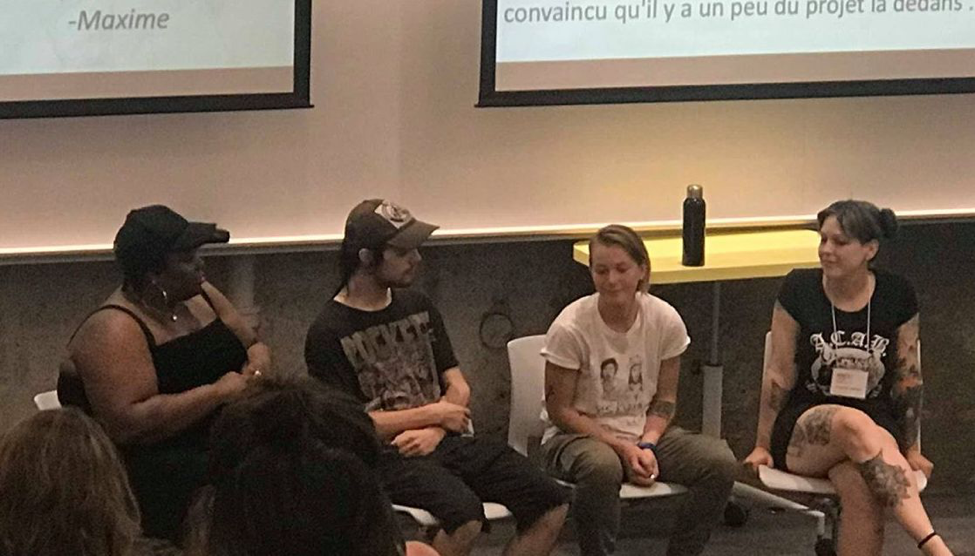With the 2019 CAEH Conference less than a month away, we are looking forward to telling folks about the work we have been doing as a research team at Dans la Rue in Montréal, and engaging in a conversation about things that public sector institutions could do differently to prevent young people from experiencing homelessness. So far, our research has focused on policy, legislation and professional practice in the province of Québec. Some of our findings are specific to Québec; other things have a more general relevance for all Canadian provinces. During our presentation, we will highlight some of the things we have learned so far and invite people to tell us how what we are finding is similar to, and different from, what they are experiencing and observing in their own contexts.
Our entire research team is planning to attend the CAEH this year. We are five people who have experienced homelessness and housing precarity and one who hasn’t. Jayne and Naomi are affiliated with McGill University; Max, Laurence, Micky and Shayana are affiliated with Dans la Rue, but each of us has multiple affiliations and identities that we bring to the project. One of the aims of our panel is to ensure that we bring these multiple identities to the table, rather than getting caught up in – and accidentally reifying – overly simplistic and dualistic categories (e.g., lived experience researcher and professor). To achieve this aim, we have structured our panel “talk-show style’ – this means, we will take turns posing and answering questions we developed as a team and inviting audience engagement, rather than just telling the audience what we’ve been up to this last year.
We will talk as much about our integrated research and knowledge exchange (or learning) process as we will about findings because we are compelled by the relational aspects of our work. At a keynote talk Jayne gave at a conference in June, she remarked that a defining feature of our team is that we believe that the ends must always be commensurate with the means; this means that how we work together and support one another as well as the people we interact with in a research capacity is as important as the outcomes of our study. Shortly after she made this claim, she invited the team to the stage and we finished the keynote (on participatory research) as a group. Given that we uphold explicit and unapologetic equity aims in terms of our research, our ways of working together and with others must also be driven by a concern with justice and equity. In practice, this means that if we are finding, for example, a particular institutional process disadvantages a certain group of people who represent only 5% of the total population, we do not dismiss this finding as inconsequential. On the contrary, we pay careful attention to the ways that particular institutional policies and processes systematically disadvantage or advantage particular groups.

In our team, we are similarly attentive to and accommodating of people’s shifting and divergent needs and strengths. People often take breaks for school, to do some intensive mental health or addictions work, to attend a conference or travel to see family. We try to exercise patience and understanding, while simultaneously holding one another accountable to high expectations for the work. Of course, this does not mean that our team is untouched by asymmetries of power; rather, we endeavour to acknowledge and disrupt the various ways that power circulates in and around the project.
In Edmonton, we will talk about these commitments. We will tell you about our study design and our strategic effort to do research that is non-objectifying and socially just, but also to produce findings that are compelling to policy decision-makers and practitioners – such that our findings contribute to resolving some of the structural and systemic barriers youth experiencing homelessness face. In addition to sharing these emerging findings, we will tell our audience how we intend to mobilize these into prototype interventions using design and testing strategies developed for the technology sector.
For anyone interested in participatory modes of research and/or development, this session will be of interest. We think it will also be of interest to people in frontline organizations that participate in research projects with university researchers because the model we have developed centralizes equitable participation and meaningful collaborations across academic and non-academic contexts. Our efforts to identify concrete policies, processes and practices that contribute to housing stability and instability should also be of interest to anyone who wants to ensure that public sector institutions (e.g., child welfare and schools) are not inadvertently contributing to young people’s vulnerability to homelessness and exclusion even as they ostensibly seek to advance young people’s best interests.
--
This post is part of our #CAEH19 blog series which highlights research on preventing and ending homelessness that is being presented at the 2019 National Conference on Ending Homelessness, Nov 4-6 in Edmonton, AB. Learn more about Noami and Jayne's work through their presentation within the Meaningful Engagement with People with Lived Experience in Research session on Monday, November 4th at 4:00 pm.


